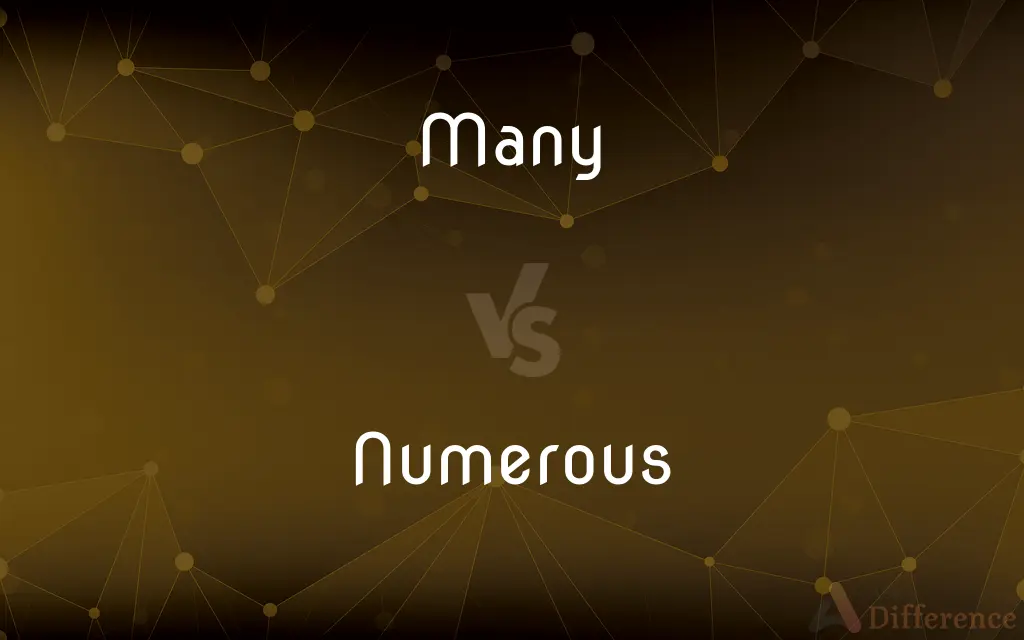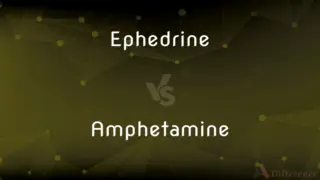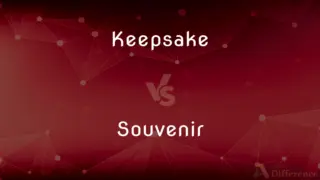Many vs. Numerous — What's the Difference?
By Tayyaba Rehman & Urooj Arif — Updated on April 3, 2024
Both imply a large quantity, but "many" is more common in conversation, whereas "numerous" often appears in formal writing.

Difference Between Many and Numerous
Table of Contents
ADVERTISEMENT
Key Differences
"Many" is a versatile word used to indicate a large number of items, people, or occurrences. It's a term that's commonly used in both spoken and written English, fitting seamlessly into everyday conversations and informal texts. On the other hand, "numerous" conveys a similar meaning of a great quantity but tends to carry a slightly more formal tone. It's often preferred in written language, especially in academic or professional contexts, where a more sophisticated vocabulary is desired.
When discussing quantity, "many" is typically used in negative constructions or questions, reflecting its broader utility in everyday language. For example, questions like "How many people are coming?" or statements such as "Not many people know the answer" are commonplace. Whereas "numerous" is more likely to be found in affirmative statements that highlight abundance or a considerable amount, such as "Numerous studies have indicated..."
In terms of nuance, "many" can sometimes imply a larger, more undefined quantity, open to interpretation based on context. "Numerous," however, often suggests not just quantity but also variety or diversity within the number mentioned, lending it a slightly more precise or nuanced implication in some cases.
The choice between "many" and "numerous" can also reflect the speaker's or writer's intent to convey a certain level of formality or emphasis. Using "numerous" in a sentence might subtly elevate the tone or seriousness of the discussion, compared to the more straightforward "many."
Despite their differences, both terms serve the essential function of quantifying nouns in the plural form. They are interchangeable in many contexts, though the choice between them can subtly affect the tone, formality, and sometimes the clarity of the message being conveyed.
ADVERTISEMENT
Comparison Chart
Tone
More informal and versatile.
Slightly more formal and sophisticated.
Common Usage
Used in questions and negative statements.
Preferred in affirmative statements highlighting abundance.
Nuance
Implies a larger, more undefined quantity.
Suggests quantity with a hint of variety or diversity.
Formality
Common in everyday conversation and informal writing.
Often found in academic, professional, or formal writing.
Function
Quantifies plural nouns, versatile in use.
Quantifies plural nouns, adding a layer of precision or emphasis.
Compare with Definitions
Many
Employed in negative contexts to denote scarcity.
Many solutions proposed were not feasible.
Numerous
Consisting of many elements or members.
The reasons for his success are numerous.
Many
A large number of; used to quantify plural nouns.
Many people attended the concert.
Numerous
Used to emphasize diversity within quantity.
The museum houses artifacts from numerous cultures.
Many
Frequently occurring; common.
Such mistakes are made by many.
Numerous
Common in formal or academic texts.
Numerous studies support this theory.
Many
Used in questions to inquire about quantity.
How many books do you have?
Numerous
Implies abundance with a hint of formality.
She has written numerous articles on the subject.
Many
Indicative of a significant amount.
Many attempts were made to resolve the issue.
Numerous
Great in number; very many.
Numerous fans gathered outside the venue.
Many
Amounting to or consisting of a large indefinite number
Many friends.
Numerous
Amounting to a large number; many.
Many
Being one of a large indefinite number; numerous
Many a child.
Many another day.
Numerous
Indefinitely large numerically, many.
There are numerous definitions of the word 'man'.
Many
The majority of the people; the masses
"The many fail, the one succeeds" (Tennyson).
Numerous
Consisting of a great number of units or individual objects; being many; as, a numerous army; numerous objections.
Such and so numerous was their chivalry.
Many
A large indefinite number
A good many of the workers had the flu.
Numerous
Consisting of poetic numbers; rhythmical; measured and counted; melodious; musical.
Such prompt eloquenceFlowed from their lips, in prose or numerous verse.
Many
An indefinite large number of.
Not many such people enjoyed playing chess.
There are very many different ways to cook a meal.
Numerous
Amounting to a large indefinite number;
Numerous times
The family was numerous
Many
(in combinations such as 'as many', 'so many', 'this many') Used to indicate, demonstrate or compare the number of people or things.
We don't need this many bananas. Put some back.
There may be as many as ten million species of insect.
I don't have as many friends as my sister does.
Many
An indefinite large number of people or things.
Many are called, but few are chosen.
Many
A multitude; a great aggregate; a mass of people; the generality; the common herd.
Democracy must balance the rights of the few against the will of the many.
Many
A considerable number.
Many
Existing in large number; numerous.
Many
A retinue of servants; a household.
Many
The populace; the common people; the majority of people, or of a community.
After him the rascal many ran.
Many
A large or considerable number.
A many of our bodies shall no doubtFind native graves.
Seeing a great many in rich gowns.
It will be concluded by many that he lived like an honest man.
He is liable to a great many inconveniences.
Many
Consisting of a great number; numerous; not few.
Thou shalt be a father of many nations.
Not many wise men after the flesh, not many mighty, not many noble, are called.
Many
A quantifier that can be used with count nouns and is often preceded by `as' or `too' or `so' or `that'; amounting to a large but indefinite number;
Many temptations
The temptations are many
A good many
A great many
Many directions
Take as many apples as you like
Too many clouds to see
Never saw so many people
Common Curiosities
Is "many" suitable for formal writing?
While "many" can be used in formal writing, "numerous" might be preferred for its slightly more sophisticated tone.
What does "many" mean?
"Many" refers to a large number of items, people, or occurrences, and is widely used in both spoken and written English.
Can "numerous" imply diversity as well as quantity?
Yes, "numerous" often suggests not just a large quantity but also a variety or diversity within that quantity.
Can "many" and "numerous" be used interchangeably?
Yes, they can be used interchangeably in many contexts, though the choice between them can affect the tone and formality of the message.
Why might someone choose "numerous" over "many"?
Someone might choose "numerous" to convey a sense of formality, precision, or to emphasize the diversity within the quantity mentioned.
How is "numerous" different from "many"?
"Numerous" implies a great quantity similar to "many" but carries a more formal tone and is often used in written, especially academic, contexts.
Is "many" more common in spoken language?
Yes, "many" is more commonly used in spoken English due to its versatility and informal tone.
How does the use of "many" in questions affect its meaning?
Using "many" in questions helps to inquire about the quantity of something, emphasizing the speaker's uncertainty about the exact number.
How does "numerous" elevate the tone of a text?
"Numerous" can add a level of sophistication and precision, making the text appear more formal or academically rigorous.
Why might "many" be used in negative constructions?
"Many" is commonly used in negative constructions to highlight the scarcity or the limited nature of something in contrast to the potential for abundance.
Do "many" and "numerous" have the same grammatical function?
Yes, both are used to quantify nouns in the plural form, though their connotations and the contexts in which they are used can differ.
Are there situations where "many" is preferable to "numerous"?
Yes, in informal conversations or when the speaker wishes to maintain a casual tone, "many" is often preferable.
What role does context play in choosing between "many" and "numerous"?
Context is crucial; "many" is often better for casual or conversational settings, while "numerous" fits formal or academic contexts.
Can the choice between "many" and "numerous" change the perception of quantity?
Yes, "numerous" might suggest a more considered or specific quantity, potentially influencing the reader's or listener's perception of the amount.
What is the impact of using "numerous" in academic writing?
In academic writing, "numerous" can lend credibility and precision to the text, indicating a thorough consideration of quantity and variety.
Share Your Discovery

Previous Comparison
Ephedrine vs. Amphetamine
Next Comparison
Keepsake vs. SouvenirAuthor Spotlight
Written by
Tayyaba RehmanTayyaba Rehman is a distinguished writer, currently serving as a primary contributor to askdifference.com. As a researcher in semantics and etymology, Tayyaba's passion for the complexity of languages and their distinctions has found a perfect home on the platform. Tayyaba delves into the intricacies of language, distinguishing between commonly confused words and phrases, thereby providing clarity for readers worldwide.
Co-written by
Urooj ArifUrooj is a skilled content writer at Ask Difference, known for her exceptional ability to simplify complex topics into engaging and informative content. With a passion for research and a flair for clear, concise writing, she consistently delivers articles that resonate with our diverse audience.














































